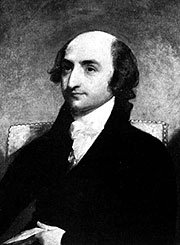Albert Gallatin
 |
| Albert Gallatin, Jefferson's secretary of Treasury, who found a way for a young, cash-starved country to pay for the Louisiana Purchase. Image © 2002 www.clipart.com. |
The great revolutionary statesman Patrick Henry called him "a most astonishing man."
He somehow managed a way for the young, cash-poor United States to pay for most of its western territory for $15 million without raising taxes.
He was kicked out of the U.S. Senate on a technicality but ended up serving longer than anyone ever has as the country's secretary of the treasury.
He proposed and helped pay for the United States' first national road.
He negotiated an end to the War of 1812.
He authored definitive studies on Native American culture and language.
He helped map out the Lewis and Clark trip. Literally.
Impressive stuff. Yet history seems to overlook Albert Gallatin.
Meriwether Lewis and William Clark didn't. When they arrived at the headwaters of the Missouri River, they found three rivers. One they named after Thomas Jefferson, another after vice president James Madison. The third they called Gallatin. In the early 1800s Gallatin was an important and well-known American.
Gallatin was Jefferson's secretary of the treasury and continued under Madison, serving both presidents from 1801 to 1814. Those 14 years remain the longest in that post in American history. The secretary is appointed by the president and is charged with advising the president on the nation's economy.
Gallatin viewed the Lewis and Clark trip in simple terms. The country was $80 million in debt. He wanted to pay that off. He saw two main ways of making money to do that: sell public land and tax imported items. Despite what the U.S. government already owed, Gallatin found $15 million to pay for the Louisiana Purchase while still keeping the treasury afloat. Gallatin knew that land in the territory Lewis and Clark were exploring could eventually be sold. However, most of it was a mystery. He hoped the explorers could describe the region better. That would raise its value.
Just as important a contribution to the expedition was the special map Gallatin, a serious map collector, had drawn up for Lewis. It showed North America from the Pacific to the Mississippi River. It included what was known about the Missouri River up to the Mandan villages in the Great Bend of the river. Gallatin took some guesses about the Rockies and course of the Columbia. The three certain points on the map were the latitude and longitude of the mouth of the Columbia, of St. Louis, and of the Mandan villages.
Gallatin's accomplishments did not surprise Jefferson. The president had seen his work as a congressman during the 1790s. Gallatin was born in Geneva, Switzerland, to an old and noble family. He came to America in 1780 at the age of 19 because of "a love for independence in the freest country of the universe." He arrived in Boston and served in the Revolutionary Army and later taught French at Harvard University. He eventually settled in western Pennsylvania, where he served in the state legislature. Next he was elected to the U.S. Senate, but political opponents said he hadn't been an American citizen long enough to serve as a senator. As a result, he was forced to leave the Senate in 1794 but was elected as a Pennsylvania congressman that same year. He served until 1801 when Jefferson appointed him secretary of the treasury. Jefferson especially liked how Gallatin fought the Federalists, Jefferson's hated congressional opponents. Gallatin questioned how the Federalists spent government money. He reacted by helping form what became today's House Ways and Means Committee. He also chaired it. This committee votes on any bill that proposes spending government money. Gallatin saw this as a way to check the Federalists' spending.
As treasury secretary, Gallatin cut the national debt almost in half by 1812. He set up processes to strictly monitor what the government spent and earned. His work paid off. By 1833 the government owed nothing.
In 1808 he proposed improvements to the U.S. transportation system. Included was the creation of a national road providing an East-West trade route. Today's Route 40 is the result. It stretches from coast to coast.
Gallatin was a true statesman. In 1814 he helped negotiate the Treaty of Ghent. It ended the War of 1812. That was the last time the United States fought the British. It also cemented the United States as an independent power.
Leaving the Treasury in 1814, Gallatin served as minister to both France and England. He moved to New York City in 1817 and eventually became a leading banker. He also founded New York University. As a scholar, he started the American Ethnological Society. He researched Indian languages and was noted for his insistence on facts. He disagreed with others of his time who used flawed studies to justify treating Native Americans differently.
Gallatin died in 1849 at the age of 88. He left his mark in many ways. Perhaps most unusual was as one of the country's first "spin doctors." When reviewing Lewis and Clark's orders, he asked Jefferson a "what if" question. He wondered what people would think if the expedition didn't find a Northwest Passage to the Pacific Ocean. He wanted good publicity no matter what happened, so he suggested calling the trip an expedition for scientific discovery. And that's why Lewis and Clark were scientists in search of species unknown to European Americans.
And oh, they just happened to have "…discovered the most practicable rout which does exist across the continent by means of the navigable branches of the Missouri and Columbia Rivers." (Lewis, Sept. 23, 1806)
< previous | next > | 


